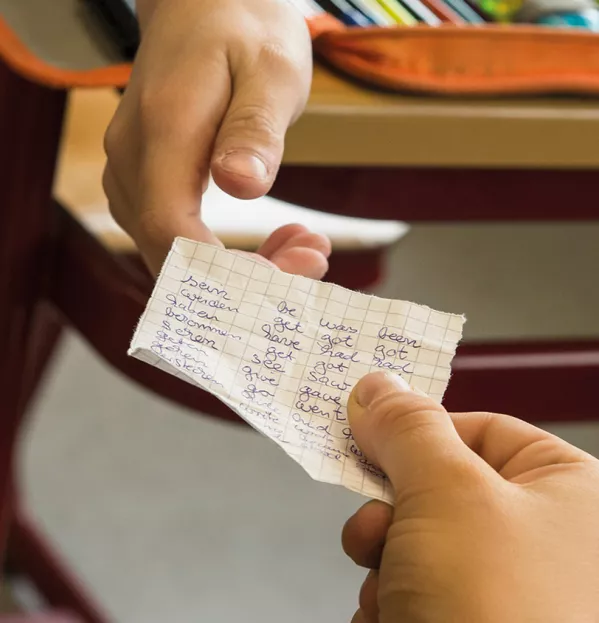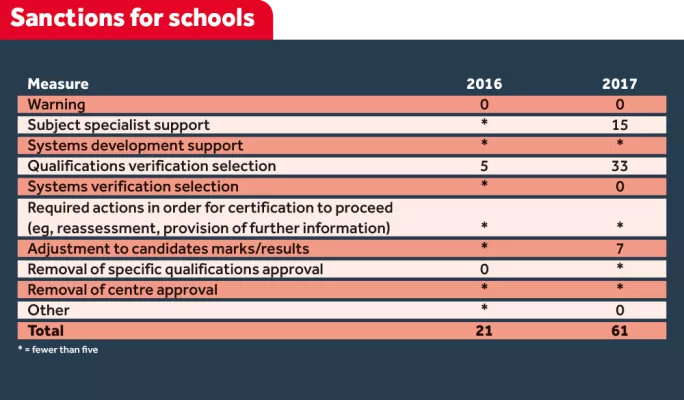
Revealed: SQA’s secret sanctions

If you want to know the number of times Scottish pupils miss out on qualifications due to cheating in exams, you can: the Scottish Qualifications Authority (SQA) publishes the figures. You can also find out how many other sanctions for cheating, such as warnings or remarkings, have been applied in recent years.
But if you want to know how many penalties have been handed to schools that have cheated on behalf of their pupils or failed to adhere to SQA rules in other, less dramatic ways, you cannot. That’s because the SQA does not publish these figures.
Now, as we come to the end of the first week of this year’s exams, Tes Scotland can reveal that on seven occasions last year, pupils’ marks or results were changed because schools failed to comply with SQA rules and regulations.
Overall, 61 sanctions were dished out to schools by Scotland’s exam body in 2017 because teachers failed to adhere to the rules on the delivery of national qualifications - up from 21 sanctions the previous year.
The figures, revealed through a freedom of information request, show that in both 2016 and 2017, the SQA was forced to use its most serious sanction: the removal of a school or college’s approval to deliver SQA qualifications.
The next most serious sanction, the removal of approval for a specific qualification, was also used by the body last year.

The details of the sanctions handed down to schools by the SQA follow the revelation earlier this year that proven cases of “centre malpractice” - which range from teachers deliberately flouting regulations and falsifying documents, to administrative errors - had risen from 18 cases in 2016 to 51 last year.
The most common reason for a finding of centre malpractice was pupils being given too much support by teachers.
Last year, one of the highest-attaining schools in Scotland, East Renfrewshire’s Mearns Castle High, hit the headlines after it was investigated by the SQA for giving pupils too much feedback on Higher assignments in geography, history and modern studies, which count towards the final mark.
The SQA, however, refused a Tes Scotland request to reveal details of the full range of centre malpractice cases it dealt with last year.
The body argues that it “relies heavily on self-reporting” and that to put the detail of cases “in the public domain would substantially inhibit this culture of self-reporting”.
It says that no teacher has been referred to the teaching watchdog, the General Teaching Council for Scotland (GTCS), as a result of an SQA investigation into centre malpractice because its focus is on the centre presenting students for exams (most of which are schools), not the individual teacher.
‘Buried’ cases
The SQA says that headteachers and local authorities can go to the GTCS if they have concerns about a teacher’s professionalism following an SQA investigation into centre malpractice. But a secondary head tells Tes Scotland that cases of teachers helping their pupils cheat in exams are being “buried” by councils seeking to avoid the negative publicity associated with taking a case to the GTCS.
The headteacher is calling for the SQA to report any suspected cases of teacher malpractice to the GTCS.
“That would be a wonderful disincentive, and it would cause people to think twice,” says the head, who asked not to be named.
The SQA says it is “difficult to draw firm conclusions” from the data about what is behind the rise in centre-malpractice cases and sanctions.
Larry Flanagan, general secretary of the EIS teaching union, says it is “a matter of regret” that the number of such cases is rising. The SQA is guilty of making “significant changes” to qualifications, which are poorly communicated to teachers, he adds.
In 2016, education secretary John Swinney decided to scrap unit assessments, which were blamed for creating a testing treadmill in schools, and putting pressure on both teachers and pupils. These were removed from National 5 last year, apart from in exceptional circumstances, and this year they have been removed from the Higher, with knock-on effects for coursework and the final exam.
Flanagan says: “Last session, significant changes took place in relation to National 5 qualifications and EIS members in schools had to raise concerns about late notification of altered arrangements and poor SQA communications around the new processes. Despite that, only 51 cases emerged over the whole qualification system where SQA had to intervene. No doubt increased familiarity in schools with the new qualifications and procedures will address some of the issues highlighted.”
The most common sanction used by the SQA in cases of malpractice last year was “qualification verification selection” whereby schools have their assessment practices reviewed and, if required, the SQA requests amendments. It was used on 33 occasions.
Subject specialist support, when SQA subject experts support schools with their assessment practice, was used as a sanction on 15 occasions, while adjustments to candidate’s marks or results were made seven times.
Overall, the SQA recorded 51 incidents of proven centre malpractice last year and handed out 61 sanctions to schools. In 2016, the SQA recorded 18 incidents of proven centre malpractice and applied 21 sanctions.
You need a Tes subscription to read this article
Subscribe now to read this article and get other subscriber-only content:
- Unlimited access to all Tes magazine content
- Exclusive subscriber-only stories
- Award-winning email newsletters
- Unlimited access to all Tes magazine content
- Exclusive subscriber-only stories
- Award-winning email newsletters
You need a subscription to read this article
Subscribe now to read this article and get other subscriber-only content, including:
- Unlimited access to all Tes magazine content
- Exclusive subscriber-only stories
- Award-winning email newsletters
- Unlimited access to all Tes magazine content
- Exclusive subscriber-only stories
- Award-winning email newsletters